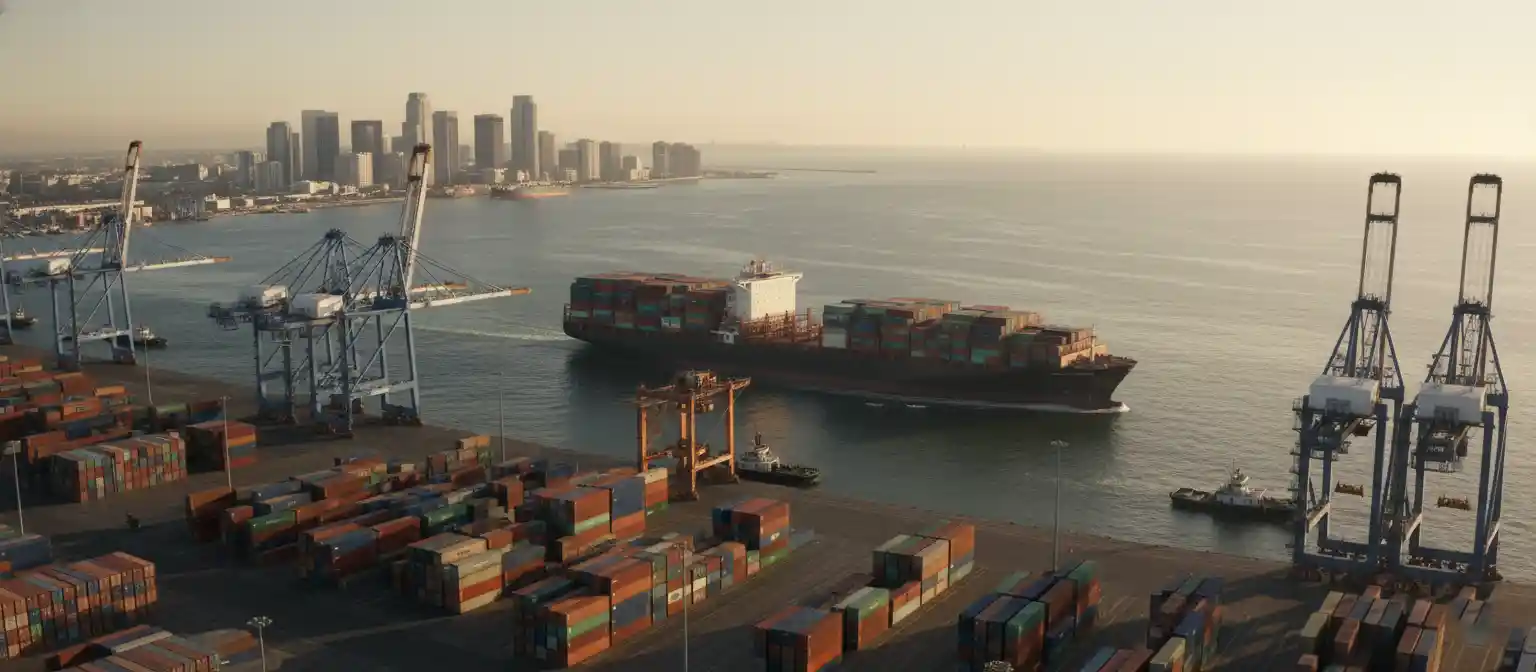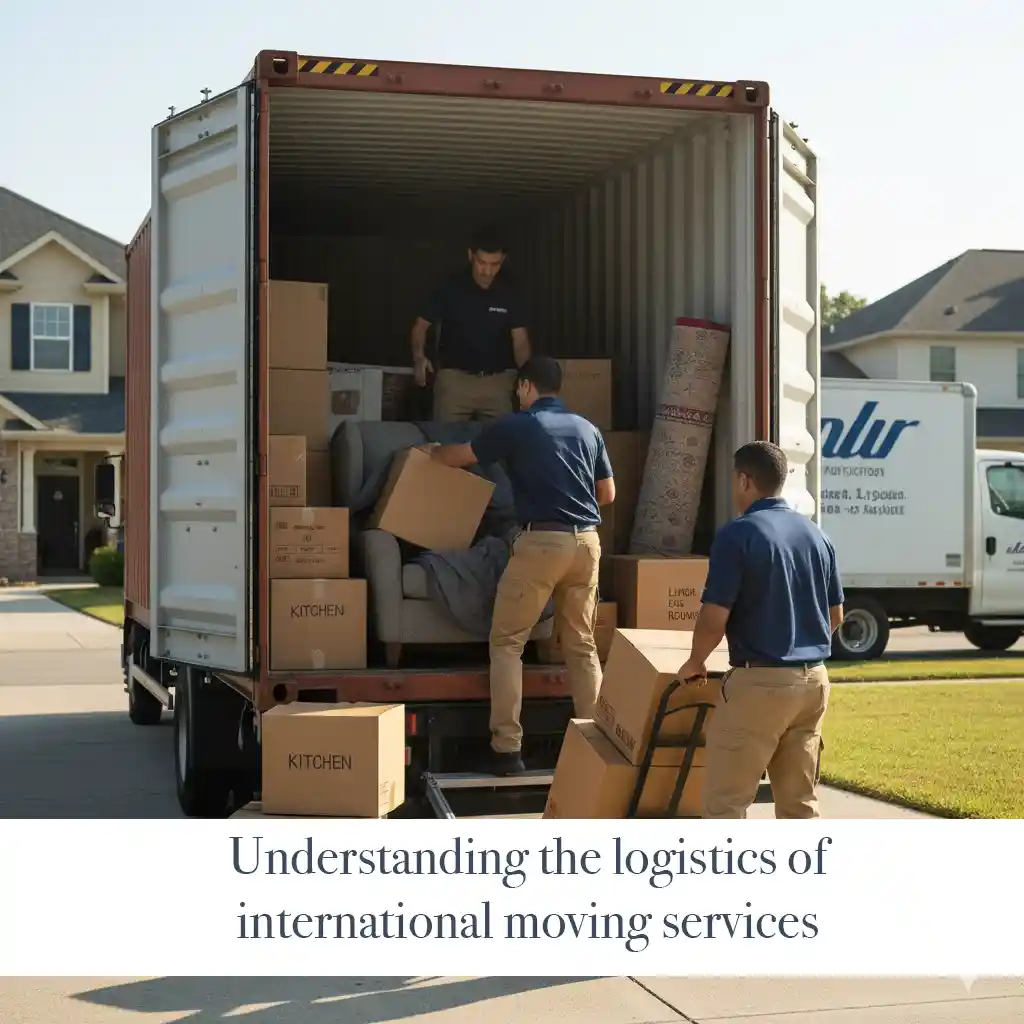E.E. Ward Moving & Storage
Beyond the packing tape: The hidden logistics that define your international move's success

A successful international move isn't just about finding the right boxes or choosing a company with a nice website. The most critical part of the process is understanding the complex 'chain of custody'—the series of logistical handoffs between warehouses, ports, customs agents, and local delivery partners where the majority of delays, damages, and hidden costs are born. This guide illuminates that hidden journey.
The illusion of a single journey: Your belongings' real itinerary
When you sign a contract for a door-to-door international move, it’s natural to imagine your belongings being picked up, placed on a ship, and delivered to your new home in one seamless motion. The reality is far more complex. Your household goods are not just being moved; they are being managed through a sophisticated international moving supply chain. This distinction is the first and most crucial concept to grasp.
Modern global commerce operates on a principle that is essential to understand for your relocation: in today’s global competitive environment, individual companies no longer compete as autonomous entities but as supply-chain networks. Your moving company isn't an island; its value and reliability are directly tied to the quality and integration of its network of partners. This network includes freight forwarders, ocean liners, customs brokers, and destination delivery agents. This is the difference between customer-facing services and the back-end supply chain management that truly gets the job done.
- Customer-Facing Services: This is what you see and interact with—the sales consultant who provides a quote, the professional packers who arrive at your home, and the branded truck. While important, these elements are only the first step in a much longer process.
- Back-End Supply Chain: This is the invisible engine of your move. It involves coordinating with port authorities, booking space on a container ship, navigating customs regulations in a foreign country, and arranging for a vetted local crew to handle the final delivery. This is where expertise truly matters.
Focusing only on the surface-level advice—like packing tips or initial quotes—without scrutinizing the provider's logistical capabilities is like planning a flight based only on the quality of the airport lounge. The journey itself is what matters most.
Deconstructing the chain of custody: Where your belongings actually go
The "chain of custody" refers to the chronological documentation and physical control of your shipment as it moves from one handler to the next. Every handoff is a potential point of failure. A true professional international mover doesn't just transport goods; they manage these handoffs with precision. Let's break down the four most critical stages.
The Consolidation Blind Spot: The journey before the journey (LCL shipments)
Unless you’re moving a very large home, your belongings will likely travel as a "Less than Container Load" (LCL) shipment. This is often the most economical and cheapest way to move personal items overseas. An LCL shipment means your items share container space with goods from other clients. In contrast, a "Full Container Load" (FCL) gives you exclusive use of an entire container, which is faster but more expensive.
Here's the logistical reality of LCL international moving that is often a blind spot for customers:
- Pickup and Warehousing: After our professional packers prepare your home, your items are transported not directly to the port, but to a consolidation warehouse.
- The Waiting Game: Your shipment will wait at this warehouse until the moving company has enough volume from other shipments going to the same destination region to fill a container. This consolidation process is a major variable affecting "how long does international shipping take for household goods." Your items could be at the warehouse for a few days or, with less organized movers, several weeks before the ocean freight portion of their journey even begins.
- Loading: Once enough volume is gathered, the consolidated items are carefully loaded into a large shipping container. A detailed inventory and loading plan is critical to prevent damage and ensure everything is accounted for.
This "consolidation blind spot" is a primary source of delays. When comparing international moving quotes, it's vital to ask about the company's typical consolidation times for your destination country. A reputable service will have consistent shipping schedules and can give you a realistic timeline for this initial, yet crucial, phase.

Decoding the Docks: Your mover, the freight forwarder, and the ocean liner
Once your belongings are in a container and on their way to the port, several different entities become involved. Understanding their distinct roles is key to knowing who is responsible for your shipment at each stage.
- Your International Mover: Think of us as the project manager or general contractor for your entire international relocation. We plan the logistics, hire and vet all the subcontractors (like the freight forwarder and destination agent), and serve as your single point of contact. We are ultimately responsible for the success of the door-to-door international moving process.
- The Freight Forwarder: This is a specialized agent who handles the booking of your shipment with the actual transport line. They negotiate rates, manage the complex paperwork required at the port of origin, and ensure your container gets loaded onto the correct vessel. They are experts in freight forwarding for personal effects.
- The Ocean Liner or Air Carrier: These are the companies that own and operate the vessels and aircraft (e.g., Maersk, MSC, FedEx). They are responsible for the physical transport of the container from port to port. Your mover, through the freight forwarder, is their client. Your relationship is with your mover, not the liner. The legal document governing this stage is the Bill of Lading, a receipt and contract for the shipment.
As you can see, the process requires that for an international move, you may need to arrange to move your boxes and furniture onto an air or ocean freighter and navigate the customs clearance process at your new country’s port of entry. A full-service international moving company manages all these relationships on your behalf, which is the core benefit of not trying to coordinate this yourself.
The Customs Gauntlet: Beyond a simple checklist
Of all the challenges of international moving logistics, customs clearance is the most frequent source of significant delays and unexpected costs. Getting through customs is not just about having the right documents; it’s about having the right expertise on the ground at your destination.
The fact is that each country has its own regulations and requirements when it comes to customs procedures, documentation requirements for shipments, tariffs, duties, and taxes. This is where a moving company’s experience pays dividends. Here’s what’s happening behind the scenes:
- The Destination Agent: A quality international mover has a deeply vetted partner, known as the destination agent, in your new country. This agent is a licensed customs broker for personal effects. They take your paperwork—the customs declaration form, detailed inventory list, and visa/residency documents—and formally submit it to the local customs authority.
- Why Items Get Inspected: Inspections can be random, but they are often triggered by vague or incomplete paperwork. If an inventory list just says "10 boxes of kitchen items," it raises more suspicion than one that specifies "dishes, glassware, small appliances." Prohibited items (like certain foods, plants, or electronics) or discrepancies between the declaration and the container's contents can also trigger a full physical inspection, leading to long delays and high fees.
- Calculating Import Duties and Taxes: Most countries allow you to import used household goods duty-free under certain conditions (e.g., you've owned them for over a year and are moving for residency). However, new items, vehicles, wine/spirits, and other specific categories are often subject to import duties. The destination agent is critical for accurately classifying your items to minimize these costs legally and ensure there are no surprises.
The best way to avoid customs delays when moving is to work with a mover who provides meticulous guidance on preparing your international moving and shipping documentation and who has a strong, experienced agent at the destination port.
The 'Last Mile' Risk: The most critical, overlooked handoff
Your container has cleared customs. The most stressful part is over, right? Not necessarily. The final stage, often called "final mile delivery," is where the quality of your moving company's partner network is truly tested. The team that arrives at your new home is typically a local moving company contracted by your primary mover’s destination agent.
This is arguably the most overlooked—and one of the most critical—factors for a stress-free delivery. The risks in this final handoff are significant:
- Lack of Proper Equipment: Will the local crew have the right equipment to navigate narrow streets or handle heavy furniture in an apartment building without an elevator?
- Communication Barriers: Is the crew supervised by someone who can communicate clearly with you about the delivery plan and placement of items?
- Accountability and Professionalism: Are they trained professionals who will carefully unload, unwrap, and place your furniture, or are they temporary laborers who might cause damage? Will they remove all the debris after unpacking?
A premier international moving service invests heavily in vetting and maintaining relationships with high-quality destination partners. They don’t simply find the cheapest available crew. They ensure the team at the end of the journey upholds the same standards of professionalism and care as the team that started it.
Key factors in choosing a true logistical partner
When comparing international moving quotes, you need to look beyond the price and evaluate a company's ability to manage the entire chain of custody. Here are the factors that truly matter, presented in a way that helps you ask the right questions.
A company's expertise in navigating customs and import/export procedures.
This goes beyond providing you with forms. An expert company will review your detailed inventory list for customs, advise you on how to declare items to minimize duties, and have proactive knowledge of regulations for your specific destination country.
The quality and integration of their international partner network.
Ask potential movers about their relationship with their destination agents. How long have they worked with them? Are they part of recognized international moving associations (like FIDI or IAM) that require members to meet strict financial and operational standards? A strong network is a sign of a reliable service.
Transparency regarding potential chokepoints in the logistical chain.
A trustworthy partner won’t promise a flawless journey. Instead, they will educate you on the potential for delays at consolidation, at sea, or in customs. They will provide a realistic international moving timeline and planning guide and explain how their process is designed to mitigate these risks.
Management of cross-border documentation and regulations.
This is a core competency. Look for a mover who assigns you a dedicated relocation coordinator. This person should be your single point of contact, ensuring that all documents—from the bill of lading to the customs forms to your international relocation transit insurance—are correct and submitted on time. While international movers operate globally, it's worth noting that a company's domestic credentials can be an indicator of their professionalism. For moves between states, a mover must have a number issued by the Department of Transportation, which serves as a license to haul cargo in interstate commerce. This demonstrates a baseline of regulatory compliance and accountability.
Answering your core questions about international moving
Navigating an overseas relocation can feel overwhelming. Here are direct answers to some of the most common questions we receive.
How does international logistics work?
International logistics is the management of the flow of goods across at least one international border. For household goods, this means a multi-stage process involving professional packing, ground transport to a warehouse, consolidation into a larger container (for LCL), booking with a freight forwarder, ocean or air transit, customs clearance by a destination agent, and final mile delivery by a local crew. The key is the coordination of all these separate entities.
What is the difference between logistics and international logistics?
While domestic logistics involves moving goods from A to B within one country's set of rules, international logistics adds multiple layers of complexity. These include navigating customs and import/export laws of two or more countries, dealing with different languages and currencies, managing multiple modes of transport (truck to ship to truck), and handling a much more extensive set of documentation.
How much does an international moving company cost?
There is no simple answer, as the cost breakdown for an international move depends on several key variables. A precise international moving cost calculator would need to factor in:
- Volume/Weight of Your Shipment: This is the single biggest factor. Costs are typically calculated by cubic feet or meters.
- Mode of Transport: Shipping household goods by sea freight is significantly cheaper than air freight, but much slower. Air freight is best for small, urgent shipments.
- Origin and Destination: The distance and specific routes (e.g., shipping personal belongings to Europe vs. Asia) impact cost. Port fees and local labor costs also vary widely.
- Service Level: A full door-to-door international moving service that includes packing, customs clearance, and unpacking will cost more than a port-to-port service where you handle the inland portions yourself.
To truly understand the costs, you must get a detailed, in-home or virtual survey to determine the exact volume of your goods and receive a comprehensive quote.
Making the Right Choice for Your Needs
The "best" international moving company is not a one-size-fits-all designation. The right partner for you depends entirely on your personal situation, priorities, and the nature of your belongings. Here is our advice for three common types of international movers.
For the Corporate Relocatee
Your primary need is a seamless, white-glove experience that minimizes disruption to your work. You require a single point of contact who manages the entire chain of custody from start to finish. Look for a company that offers comprehensive corporate international relocation services, including temporary housing assistance and a proven track record of managing moves for executives. Your decision should be based on reliability and project management excellence, not just the lowest price.
For the First-Time Expat
Your biggest concern is avoiding surprises and hidden costs. You need a partner who is patient, educational, and transparent. The right company will take the time to walk you through each step of the customs process, explain the documentation requirements clearly, and set realistic expectations for the timeline and potential delays. Prioritize a company that offers a dedicated coordinator who is responsive and willing to answer all your questions, providing the guidance and tips for a smooth international relocation you need to feel confident.
For the High-Value Shipper
If you are moving valuable art, antiques, or specialized equipment, your focus must be on a mover with demonstrable protocols for handling fragile items. Ask for specifics about their crating and specialty packing for fragile items. Inquire about their security measures at consolidation warehouses and the insurance levels of their destination partners. You need a mover who sees themselves not just as a transporter, but as a custodian of irreplaceable assets, with an impeccable record in international furniture shipping logistics.
Ultimately, a successful international move is a feat of expert project management. It requires a deep understanding of a complex global supply chain and the ability to control the process through every critical handoff. With over 140 years of experience in the moving and storage industry, E.E. Ward has built the global partnerships and logistical expertise required to manage that chain of custody with precision and care. If you are planning a move abroad from anywhere in the U.S., our team of international relocation specialists is ready to provide a detailed assessment of your needs and a transparent, comprehensive quote. Contact our team, headquartered in North Carolina, to begin planning your journey with confidence.
Get a Quick Estimate For Your Upcoming Move!
We are here to help! Fill out our Quick Moving Estimate inquiry form and our team will contact you soon with a free estimate. Contact the office moving company with over a century of moving experience. Whether it’s a local downtown move or long-distance relocation — including business moves — we’re ready to help.




